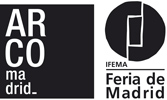#OpeningARCOmadrid 2017 | ESTUDIOS. TABACALERA | 22.02.2017 - 26.03.2017
Our bodies are shaped by our relations with the world surrounding us. They are metabolizing, productive and reproductive markers of subjectivity just as much as they are entities onto which control is exerted from a variety of social, political and physical forces. Bodies radiate with intensity and are susceptible to malleability at the same time. “Under the skin the body is an over-heated factory” said Antonin Artaud.
Let us think about the bodies of the cigarreras who made the factory work and nurtured the social life of Lavapiés. What was their life inside the factory like? Which were the rhythms of work, the organization of spaces and the occupation of collective areas? What were the relationships between the factory machine and the bodies that inhabited it? This space, situated in the preserved bathrooms of the workers, prompts a number of questions about the disciplining of bodies, hygiene, care, repetitive movements and work rhythms. Standardized production schedules and normalized ideals shape bodily behavior in the work place and lavatories respectively, and resonate here in the rows of wash basins installed one after another in a straight line. Bathroom furnishings are perhaps the architectural elements most adapted to the human body. At the same time, systems of control affecting the behaviors and representations of bodies begin in these kinds of intimate and personal spaces.
The videos and photographs by Joanna Piotrowska (Warsaw, Poland, 1985) are distributed throughout the different dressing rooms, investigating identity as an unstable category, as related to, with and through the body. Piotrowska photographs her subjects in ambiguous poses reflecting on social constellations and our entangled connections with others. Domesticity and public identity are in constant negotiation, extrapolated by the spatial and underlying psychological tensions present in an occupational-functional place like the factory, and an intimate disciplining space like the bathroom.
Canción cantada durante la ejecución de un trabajo físico difícil [Song sung while doing difficult physical work] is a large curtain by Jazmín López (Buenos Aires, Argentina, 1984), inspired by the uniforms of the cigarreras and reminiscent of banners used in social movements. Hanging in an empty space, the uniforms have changed their form and turned theatrical. López’s fabrics are extensions of notions of domestic and public space analogous to garments; they are divisors and connectors at the boundaries of bodies and the spaces between them that affect human relations: skin and clothes. Si esto es un hombre [Veronica] (If this is a man [Veronica]) is a large mirror that breaks up the symmetry of the space and its controlling function, accentuating a missing architectural element inciting us to verify our outer appearance. Both works speak of the influence that material and architecture have on those who inhabit a space, and shape the movement of visitors through the exhibition.
On the tip of the tongue by Adélaïde Feriot (Libourne, France, 1985) consists in a velvet fabric placed on the floor and a series of wax sculptures reminiscent of human feet prostheses. In certain moments, two performers enter posing on tip-toes, trying to fixate that which is not meant to be fixated. Feriot treats clothes and costumes as prosthetic extensions of the body that define the way we move and behave. Her tableaux vivants reflect on the proxemics between human bodies and how we unconsciously structure micro space in our daily transactions. Temporality and rhythm, repetitive tasks of factory work and the disciplining of bodies through architectural, social or tactile-kinetic givens, inscribe themselves in the body and structure our subjectivity.
The three artists generate different layers of reflection and action around questions concerning the body and how it is related, molded or controlled. In a former factory space now turned into a post-Fordist cultural machine, their works create a close dialogue with the architecture, its history and context, while attempting to influence the relationships between bodies and the structures that surround them, the behaviors they provoke and the representations they give rise to.
* The exhibition title is a phrase from Antonin Artaud’s Fragments of a Diary from Hell
Juan Canela y Stefanie Hessler
> ESPAÑOL
Credits
Organised by: Subdirección General de Promoción de las Bellas Artes. Ministerio de Educación, Cultura y Deporte
Curators: Juan Canela y Stefanie Hessler
Coordinator: Mariflor Sanz
Opening ARCOmadrid 2017


EXPOSICIÓN / Artes Visuales
Más información
Estudios. Tabacalera
Embajadores 51. Madrid
Open from Tuesday to Friday from 12 a.m. to 8 p.m. Saturdays, Sundays and holidays from 11 a.m. to 8 p.m. closed Monday.
Free entrance






